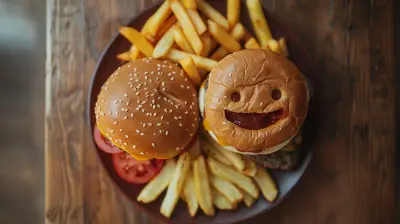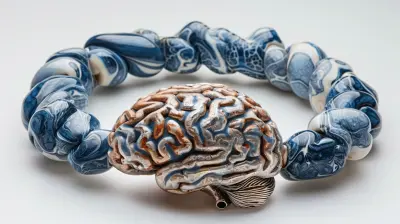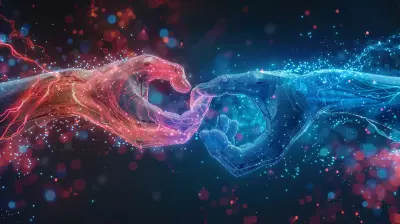24 November 2024
Addiction is a powerful force. It can warp the mind, hold you hostage, and make you feel like you're trapped in a never-ending cycle. But what exactly fuels this cycle? How does something that begins as a choice spiral out of control? And perhaps most importantly, how do people find their way back to recovery? In this article, we’re going to dive deep into the psychology of addiction and recovery, unraveling the complex inner workings of the mind, and shedding light on the road to healing.

What is Addiction?
Addiction is often misunderstood. It's not just about overindulging in something you enjoy—it's much deeper than that. Addiction is a chronic condition characterized by the compulsive pursuit of a substance or behavior, despite harmful consequences.People become addicted to all sorts of things—drugs, alcohol, gambling, even social media. But no matter the substance or behavior, one thing remains consistent: addiction hijacks the brain. It rewires how we think, feel, and act.
The Brain on Addiction
To truly understand addiction, it's essential to take a closer look at the brain. Our brains are wired to seek pleasure and avoid pain. When we engage in pleasurable activities—whether it’s eating a delicious meal, laughing with friends, or exercising—the brain releases dopamine, a chemical that makes us feel good.Now, here’s where things start to go awry. Addictive substances or behaviors flood the brain with dopamine, far more than natural rewards ever could. This flood of dopamine creates an intense “high.” But over time, the brain adapts. It becomes less sensitive to dopamine, meaning you need more of the substance or behavior to achieve the same effect. This is what leads to tolerance. And when you try to quit, you may experience withdrawal, which can be both physically and emotionally painful. It’s a vicious cycle.
The Role of Genetics and Environment
You might be wondering, why do some people become addicted while others don’t? The answer isn’t simple. Genetics and environment both play a significant role.Some people are genetically predisposed to addiction. If a close family member struggles with addiction, your chances of developing an addiction yourself increase. But it’s not just about biology—your environment matters, too. Growing up in a household where drugs or alcohol are prevalent, experiencing trauma, or even being exposed to high levels of stress can increase the likelihood of addiction.

Understanding the Psychological Triggers of Addiction
Addiction doesn’t happen in a vacuum. More often than not, it’s tied to deeper psychological issues. These underlying factors can act as triggers, pushing someone toward addictive behaviors as a way to cope.Stress and Anxiety
Stress is one of the most significant contributors to addiction. When life feels overwhelming, it’s easy to reach for something—whether it’s a drink, a drug, or even food—to numb the pain. Temporary relief can feel like a lifesaver in the moment, but over time, it can lead to dependence.Similarly, anxiety can be a powerful driver of addiction. People often turn to substances or behaviors to quiet their racing thoughts or calm their nerves. While it might work initially, the long-term effects can be devastating.
Depression and Loneliness
Depression and loneliness are common companions of addiction. When someone feels isolated or disconnected from the world around them, they may turn to substances for comfort. In the short term, it may feel like the substance is filling that emotional void. However, as addiction progresses, it often deepens feelings of loneliness and despair.Trauma and PTSD
Trauma is another significant factor in addiction. Whether it's childhood abuse, neglect, or a life-altering event, many people who struggle with addiction have a history of trauma. For those with post-traumatic stress disorder (PTSD), substances can become a way to escape the painful memories and emotions associated with their trauma. Unfortunately, this coping mechanism only compounds the problem.Low Self-Esteem
People with low self-esteem or a negative self-image are also at an increased risk of addiction. They may use substances to feel more confident, escape self-criticism, or numb feelings of inadequacy. But the more they rely on these substances, the more dependent they become, creating a downward spiral.
The Cycle of Addiction
One of the most challenging aspects of addiction is the cycle it creates. At first, the addictive behavior may seem like a solution to a problem—a way to escape, cope, or feel better. But as time goes on, the individual becomes trapped in a loop. They need more of the substance or behavior to feel the same effect. When they try to stop, withdrawal symptoms kick in, making it incredibly difficult to break free.The cycle is self-perpetuating, and it can feel impossible to escape without help. But here's the good news: recovery is possible. It begins with understanding the cycle and taking steps to break it.

The Road to Recovery
Recovery is a journey, not a destination. It's about learning to live life without relying on substances or addictive behaviors. And while it’s not an easy path, it’s one that many people successfully walk every day.Acknowledging the Problem
The first step in recovery is often the hardest: admitting there’s a problem. Many people in the throes of addiction struggle with denial. They may minimize the impact their behavior is having on their lives or convince themselves that they can quit anytime they want. But real change begins when they acknowledge that addiction has taken control.Seeking Help
Once someone acknowledges their addiction, the next step is seeking help. This can take many forms—therapy, support groups, rehab programs. It’s important to remember that addiction isn’t something most people can beat on their own. Professional help and a strong support system are crucial components of recovery.Therapy, especially cognitive-behavioral therapy (CBT), can be incredibly effective in helping individuals identify and change the thought patterns and behaviors that fuel their addiction. Support groups like Alcoholics Anonymous (AA) or Narcotics Anonymous (NA) offer a sense of community and accountability that can make a world of difference.
Rewiring the Brain
Remember how we talked about addiction rewiring the brain? Well, recovery is all about rewiring it again—but this time, in a healthy way. In recovery, the brain begins to heal. It starts producing dopamine naturally again, and over time, the intense cravings start to fade.But this process takes time, and it’s not without challenges. In the early stages of recovery, cravings can be powerful, and it’s easy to slip back into old habits. That’s why many people in recovery develop coping strategies—whether it’s meditation, exercise, or simply reaching out to a friend when temptation strikes.
Building a New Life
Recovery isn’t just about quitting the substance or behavior; it’s about building a new life. Many people in recovery find that they need to make significant changes to avoid falling back into old patterns. This might mean cutting ties with people or environments that trigger their addiction, finding new hobbies, or setting new goals.In short, recovery is about rediscovering who you are without the addiction. It’s about learning to cope with life’s challenges in healthy ways and finding joy in the simple things.
Relapse is Part of the Process
It’s important to understand that relapse is common in recovery. In fact, it’s often viewed as a normal part of the process. Many people who eventually achieve long-term recovery experience one or more relapses along the way. The key is not to view relapse as a failure, but rather as a learning opportunity.Relapse happens because recovery is hard. The brain takes time to heal, and old habits can be tough to break. But each time someone relapses, they have the opportunity to reflect on what triggered it and how they can avoid similar situations in the future.
Conclusion: Hope and Healing
Addiction is a complex and challenging condition, but it’s not insurmountable. By understanding the psychological factors that drive addiction and the steps involved in recovery, we can begin to unravel its hold. Whether you're personally struggling or supporting someone on their journey, it’s important to remember that recovery is possible. It may be a winding road, but with the right help, determination, and support, healing is within reach.If you're facing addiction, know this: You are not alone. There’s a community of people who have walked this path before you and come out the other side. And you can too.










Candice Rivera
Understanding addiction is crucial for effective recovery strategies.
January 29, 2025 at 3:23 AM